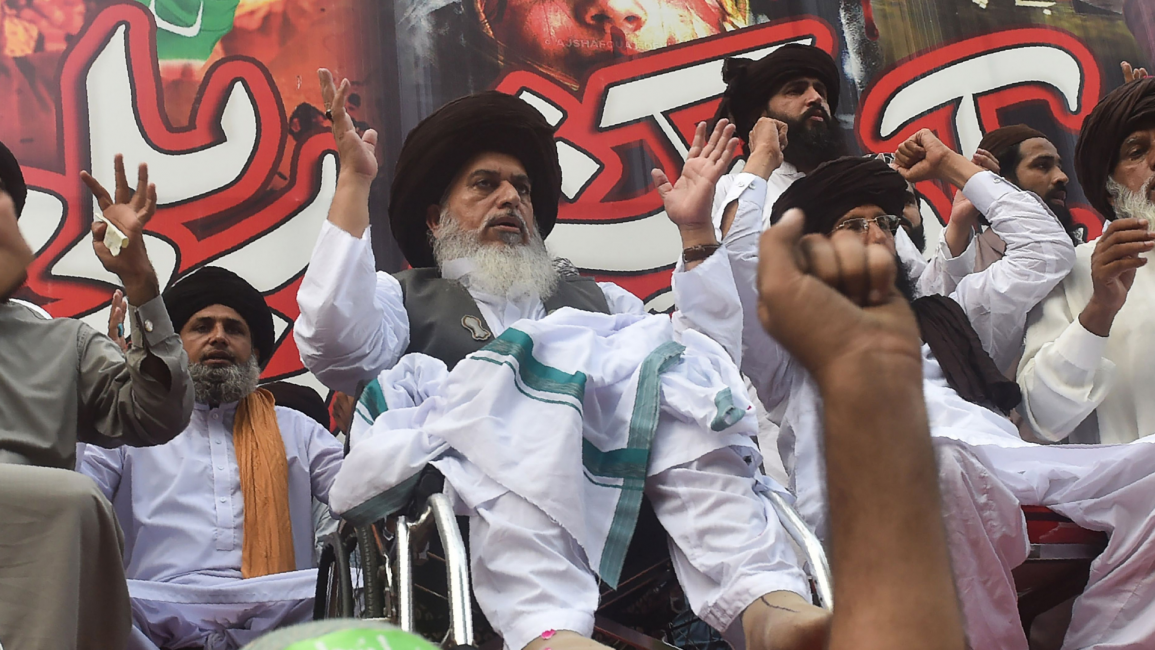Death of Pakistan's firebrand cleric clouds future of extremist movement
But following his sudden death on Thursday, days after leading a paralysing anti-France rally in the capital, Pakistan's military hailed him as a "great scholar" and Prime Minister Imran Khan offered his heartfelt condolences - both likely wary of the power of his movement.
Tens of thousands of people are expected to turn out for his funeral in Lahore on Saturday and flout mask-wearing guidelines as the country enters a second wave of the coronavirus outbreak.
No cause of death has been announced for 54-year-old Rizvi.
An official at the hospital where he died told AFP the longtime wheelchair user been suffering from a high fever and breathing problems, but no Covid-19 test or autopsy were conducted.
Rizvi had weaponised the ultra-sensitive issue of blasphemy in the Muslim-majority nation and radicalised large swathes of Punjab, opening a new chapter in Pakistan's violent confrontation with extremism.
In just a few short years, the cleric, known for his profanity-laced speeches and theatrical gestures, gained mass support and rose to become one of the country's most feared figures.
"In some ways, he was even more dangerous than the Taliban, with his supporters not limited to remote tribal areas, but present in large numbers in the country's heartlands," said Omar Waraich from Amnesty International.
Twitter Post
|
"(Rizvi) figured out that in Pakistan, true power can be commanded in the streets, where you don't need the highest number of votes - just the highest number of armed supporters."
His Tehreek-e-Labaik Pakistan party (TLP) held a three-day anti-France rally that ended after he claimed to have forced the government to agree to kick out the French ambassador.
The Pakistani government and French embassy have refused to comment on the matter.
Violent history
Blasphemy is a sensitive issue in Pakistan where anyone deemed to have insulted Islam can face the death penalty and even the whiff of unproven allegations can lead to mob lynchings and vigilante murders.
Since 2017, Rizvi and the TLP have succeeded in dictating terms to successive governments who fear sparking any backlash from religious groups.
The cleric forced the resignation of a federal minister and the firing of a leading economics advisor even as Pakistan's economy cratered.
And in 2018, the TLP brought the country to a standstill with riots following the acquittal of Christian woman Asia Bibi, who had been falsely accused of disrespecting the Prophet Mohammed.
The party has also called for the assassination of Pakistan's Supreme Court judges, pleaded for a mutiny in the armed forces and vowed to wipe out European nations such as France and the Netherlands with Pakistan's nuclear arsenal.
The group has also been linked with killings and an assassination attempt on Pakistan's interior minister in 2018, while rallying millions of supporters at the ballot box that gave them seats in a provincial government.
'Extensive support'
Whether the TLP can hold its momentum without the charismatic Rizvi is unclear.
"The TLP already has an extensive support base. His lifeline was his narrative and his narrative was still intact," security analyst Amir Rana told AFP.
"The TLP will remain on Pakistan's security and political landscape for a longer time and leadership may not be a big factor."
However, columnist Zahid Hussain chalked up the TLP's victories over the years to government weakness rather than its actual strength as a political force.
Read also: Pakistan has a problem with rape, but castration is not the answer
"I don't think anybody could provide the type of a leadership he had," he said.
"It was more of a personal following than an ideological movement."
The TLP first coalesced as a movement demanding the release of Mumtaz Qadri - a bodyguard who gunned down Punjab governor Salman Taseer in Islamabad in 2011.
Qadri later cited Taseer's demands to reform blasphemy laws as his motive and was hanged in 2016 - sparking massive protests and an outpouring of emotion during his public funeral in Lahore that set the stage for future TLP demonstrations.
"A dangerous extremist ideology now has a political platform that is driven by young, radicalised individuals that have witnessed the ability of street power in achieving their objectives, rather than going through democratic institutions," said Arsla Jawaid, a Pakistan analyst with Control Risks.
"This points to a dangerous trend, one that may grow even more radical under a new TLP leadership."
Agencies contributed to this report.
Follow us on Facebook, Twitter and Instagram to stay connected


![President Pezeshkian has denounced Israel's attacks on Lebanon [Getty]](/sites/default/files/styles/image_684x385/public/2173482924.jpeg?h=a5f2f23a&itok=q3evVtko)



 Follow the Middle East's top stories in English at The New Arab on Google News
Follow the Middle East's top stories in English at The New Arab on Google News


